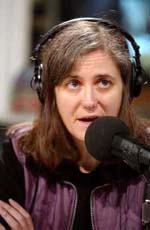Amy Goodman Speaks About
Comparing popular news coverage of the Iraqi conflict to "a video war game," media critic and news reporter Amy Goodman spoke about the role of "Independent Media In a Time of War" on February 24th at Teachers College. Goodman, who hosts and produces the non-profit daily news program Democracy Now!, shared her views about the quality and the "spin" of war news presented to Americans via the major media outlets.
Goodman is an award-winning journalist, the recipient of the Robert F. Kennedy Journalism Award, the George Polk Award, and the Overseas Press Club Award. She has just completed writing a book, The Exception To The Rulers.
Prior to the discussion a brief film was shown portraying Goodman and her work, presenting her views about the way American mass media has been covering events, particularly the war in Iraq. In the film, she described how the news American viewers receive often differs in tone and perspective from the news available to the international community, especially Western Europe and the Middle East. Logging on to CNN.com and CNN International, for example, could mean seeing alternative presentations of the day's news, depending on the audience. She added that the European and Middle Eastern media regularly report on Iraqi civilian casualties, whereas American media largely does not, and that ownership of mass media by for-profit corporations can-and does-adversely affect the quality of news coming through popular American media channels.
Goodman also faulted the majority of news organizations covering Operation Iraqi Freedom for not questioning official sources of information too closely, and not actively seeking alternative views of how the U.S. war in Iraq was unfolding. If the major U.S. media outlets participated in embedding their reporters with troops, "then let's have reporters embedded with Iraqi families, the peace movement, and the families of soldiers who have lost their lives in the war," she said.
Goodman was introduced by Dana Burde, Visiting Assistant Professor of Education at International and Transcultural Studies. Members of Burde's class, "Politics and Education in Emergencies and Post-Conflict Regions," attended the talk and participated in the question-and-answer session at the end of the Goodman's presentation.
Addressing her audience at TC, she said, "We can be proud of what teachers do in this country, and one of the things that is most important for teachers to talk about today is the role of media in this country. It's the way we understand others, and it's also is the way that others understand us. But what we have is a very few pundits, a ‘minority elite,' who know so much about so little." The media "reflects on the range of opinion between the Democrats and the Republicans," she said, "rather than the full diversity of opinion of the American people." Goodman added that out of nearly 400 interviews collectively aired by television stations CBS, NBC, ABC, and PBS in the build-up to war, only three were shown that voiced opposition to the conflict.
The event was co-sponsored by the Department of International and Transcultural Studies and Education, and the Society for International Education.
Published Friday, Sep. 3, 2004
